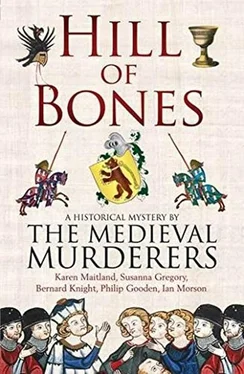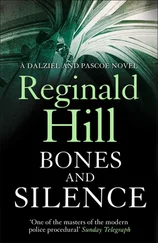‘Dear Brother Hubert, you seem in a hurry! I cannot be disturbed now, we are accounting for the wool sales.’
‘Prior, you must come at once!’ the agitated sacrist cried. He clutched the prior’s arm with his hand, which Robert shook off irritably, but before he could protest further, Hubert gabbled out the story of the missing treasures.
The sanctimonious prior placed the palms of his hands together high before his face in an attitude of prayer and rolled his eyes upwards towards heaven.
‘O Lord my God, I beseech Thee to assure me that this is some grave mistake. Surely this cannot be!’
Then he dropped his hands and spun round, snarling at both Hubert and Eldred, who was cowering behind the sacrist.
‘What have you done, you wretched souls? Which of you has stolen these priceless relics – or forgotten to lock the aumbry, eh?’ He was quivering with rage, arms upraised, his fingers clawing the air.
‘The fastenings have been smashed, Prior,’ quavered Hubert. ‘You must come and see for yourself!’
Robert shoved the two men aside and stormed ahead of them to the cloister door, with the others, including the cellarer, hurrying after him, leaving the young clerk Maurice to guard the bags of money on the table. In the presbytery, it was a matter of a moment for the prior to confirm both that the staple had been wrenched out of the door and that the top shelf was empty.
‘I possess a key, Prior!’ whined Hubert, determined to get his alibi in first. ‘So I could not be involved in this sacrilege!’
‘Nor I, for I too hold one,’ boomed Brother Gilbert, aggressively. He was a short-tempered man, as most of the residents of the abbey could testify.
The three monks swivelled to glower at Eldred, who nervously grabbed the ring on his belt and held up his own key.
‘I also have a key! It is my task to clean those blessed vessels,’ he said timorously. ‘Which I have done faithfully these past four years,’ he added.
The prior took one last desperate look into the aumbry, as if the chalice and pyx might have miraculously reappeared during the last half-minute. Then he moved to the centre of the presbytery and dropped to his knees before the altar. Once again lifting his supplicant hands before his face, he prayed in loud high-pitched voice for God, his Son, the Holy Mary and all the saints and angels to reveal who had done this awful act and to restore the sacred vessels to them, so that their humble servants might continue to worship in the manner to which they were accustomed.
The others, well aware of Prior Robert’s ostentatious show of piety, listened with varying degrees of impatience, more concerned with their own vulnerability when the prior unleashed his ire upon them. They had not long to wait, for as soon as Robert had finished talking to his Creator, he rose to his feet and with a face like thunder, pointed a quivering finger at Eldred.
‘Sacrist, send for the proctor’s men to seize this fellow!’
The fact that Eldred had suspected that he would be made the scapegoat did not lessen the terror with which he heard these words.
‘Prior, I am innocent!’ he screamed. ‘It was I who ran to tell the sacrist. I handle those holy things almost every day! Why should I steal them after all this time?’
Surprisingly, Hubert spoke up for him. ‘Prior, he does have a key. Why would he break the fastenings?’
Robert ignored him. ‘Send for the proctors, I say! Let the processes of canon law and the judgement of Almighty God decide on his guilt.’ He crossed himself vigorously again. ‘And now, set up a search throughout the abbey… throughout the whole town! Go, marshal every monk, every lay brother, every kitchen boy to leave no stone unturned! We must find those sacred treasures!’
The two proctor’s men were what passed for the police force of the abbey, keeping order amongst the lay brothers, the servants and, less often, the monks themselves. They were nominally lay brothers in that they enjoyed the Church’s protection from the secular law, but in reality were a pair of strong-arm men not over-imbued with intelligence. The actual proctors were a pair of the more senior monks, charged with the discipline of the brethren, but it was their two servants who carried out the day-to-day policing of the large abbey compound, which behind its high wall, occupied most of the south-eastern quarter of the city.
Within minutes of the prior’s peremptory command, they had grabbed Eldred and marched him off to the detention cell, a small outhouse built on to the end of the stable block at the south end of the abbey yard. As well as for the storage of animal fodder, it was used mostly for housing drunks, beggars and troublemakers found in the abbey yard, which was open to the public.
Servants, lay brothers and even novitiate monks who had transgressed the rules were also incarcerated in the cell on a diet of bread and water until they had expiated their sins. The Church jealously guarded its independence from the legal apparatus of the State, strengthened by old King Henry’s penitent promise after the murder of Thomas Becket.
After the first shock of arrest had passed off, Eldred became more philosophical about his plight, as he was sure that his innocence would soon become apparent. Although it was well over a century since King William the Bastard had conquered England, there was still a prejudice against Saxons such as himself, even though generations of intermarriage had blurred the distinction. He was being set up as the villain by the largely Norman Church, mainly because of his name and fair Saxon hair and complexion.
Despondently, he sat on the bare board that formed the bed and looked at the rest of the furnishings – a pile of hay, a battered leather bucket for his ablutions and a large wooden cross on the wall, set there by the pious Robert to remind prisoners that the Almighty was always watching them. There was nothing else to comfort him, apart from a rough blanket folded on the end of the bench. There was no window and the only light came through a gap above the heavy oaken door, which also admitted a strong stench of horse manure from the adjacent stables.
Eldred’s first concern was for his wife, Gytha. Before he was dragged away, he had managed to plead with Hubert to let her know of his arrest, so that when he failed to return home that night, she would not think that he was either dead or had abandoned her. The Abbey did not oblige lay brothers to be either celibate or resident, and Eldred and his wife lodged with two other families in a small house in Binnebury Lane, only a few hundred paces away from the main abbey gate. They had no living children and their one half of a room, divided by a curtain from a family of four, was enough for them to be content with their lot.
A few hours passed and no one came near him. As the afternoon waned, he heard the bells of the abbey church tolling for compline. It was hot and stuffy in the little room, but there was no water to drink. Eldred assumed that the prior was not going to starve him to death, or until he confessed to a crime he had not committed, but he was getting hungry, having missed his midday meal in the servants’ hall.
The thick door had no cracks for him to peer through, so he had only sounds to tell him what was happening outside. The abbey yard was a busy place, as townsfolk came in on many errands, and it was a focus for gossip and business dealings. Goods came constantly to the cellararium, ox-wagons and handcarts bringing supplies to feed and clothe the many inhabitants of the abbey. Horses whinnied nearby as they were taken in and out of the stables and the shouts of yard boys rang out as they sluiced down the soiled floors. Farriers came to shoe horses at the forge opposite, and the saddlery at the other end of the stables was always busy. But no one came near Eldred and he began to wonder if he had been totally forgotten.
Читать дальше












